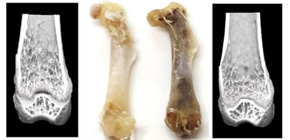
Plasmodium by-products persist in the bone marrow and promote chronic bone loss
Another hidden pathology caused by malaria infection
Cevayir COBAN’s group (Malaria Immunology) at IFReC, Osaka University, have revealed that malaria infection induces robust immune activation and invasion of parasite by-products into the bone marrow leading harmful outcome on bone homeostasis. The Coban Team have used mouse malaria models to show that even after one time malaria infection, Plasmodium products gradually accumulate in the bone marrow niche and “eaten-up” by bone resorbing cells osteoclasts. These accumulated malarial products in bone marrow niche induce MyD88-dependent inflammatory responses in osteoclast and osteoblast precursors, leading to increased RANKL expression and over-stimulation of osteoclastogenesis favoring bone resorption. Infection with a mutant parasite with impaired hemoglobin digestion that produces little hemozoin, a major Plasmodium by-product, did not cause bone loss. Importantly, malaria-mediated bone loss was found more severe in young age, leading growth retardation. The Coban Team additionally showed that supplementation of alfacalcidol, a vitamin D3 analog, reverts the adverse outcomes of malaria infection on bone. Their results highlight the risk of bone loss in malaria-infected patients and the potential benefits of coupling bone therapy with anti-malarial treatment.
Abstract
Although malaria is a life-threatening disease with severe complications, most people develop partial immunity and suffer from mild symptoms. However, incomplete recovery from infection causes chronic illness, and little is known of the potential outcomes of this chronicity. We found that malaria causes bone loss and growth retardation as a result of chronic bone inflammation induced by Plasmodium products. Acute malaria infection severely suppresses bone homeostasis, but sustained accumulation of Plasmodium products in the bone marrow niche induces MyD88-dependent inflammatory responses in osteoclast and osteoblast precursors, leading to increased RANKL expression and overstimulation of osteoclastogenesis, favoring bone resorption. Infection with a mutant parasite with impaired hemoglobin digestion that produces little hemozoin, a major Plasmodium by-product, did not cause bone loss. Supplementation of alfacalcidol, a vitamin D3 analog, could prevent the bone loss. These results highlight the risk of bone loss in malaria-infected patients and the potential benefits of coupling bone therapy with antimalarial treatment.
Figure 1
Figure 2. Malaria induces chronic bone loss due to sustained accumulation of Plasmodium products even after the cure of malaria disease.
To learn more about this research, please view the full research report entitled " Plasmodium products persist in the bone marrow and promote chronic bone loss " at this page of the Science Immunology website.
Related links
